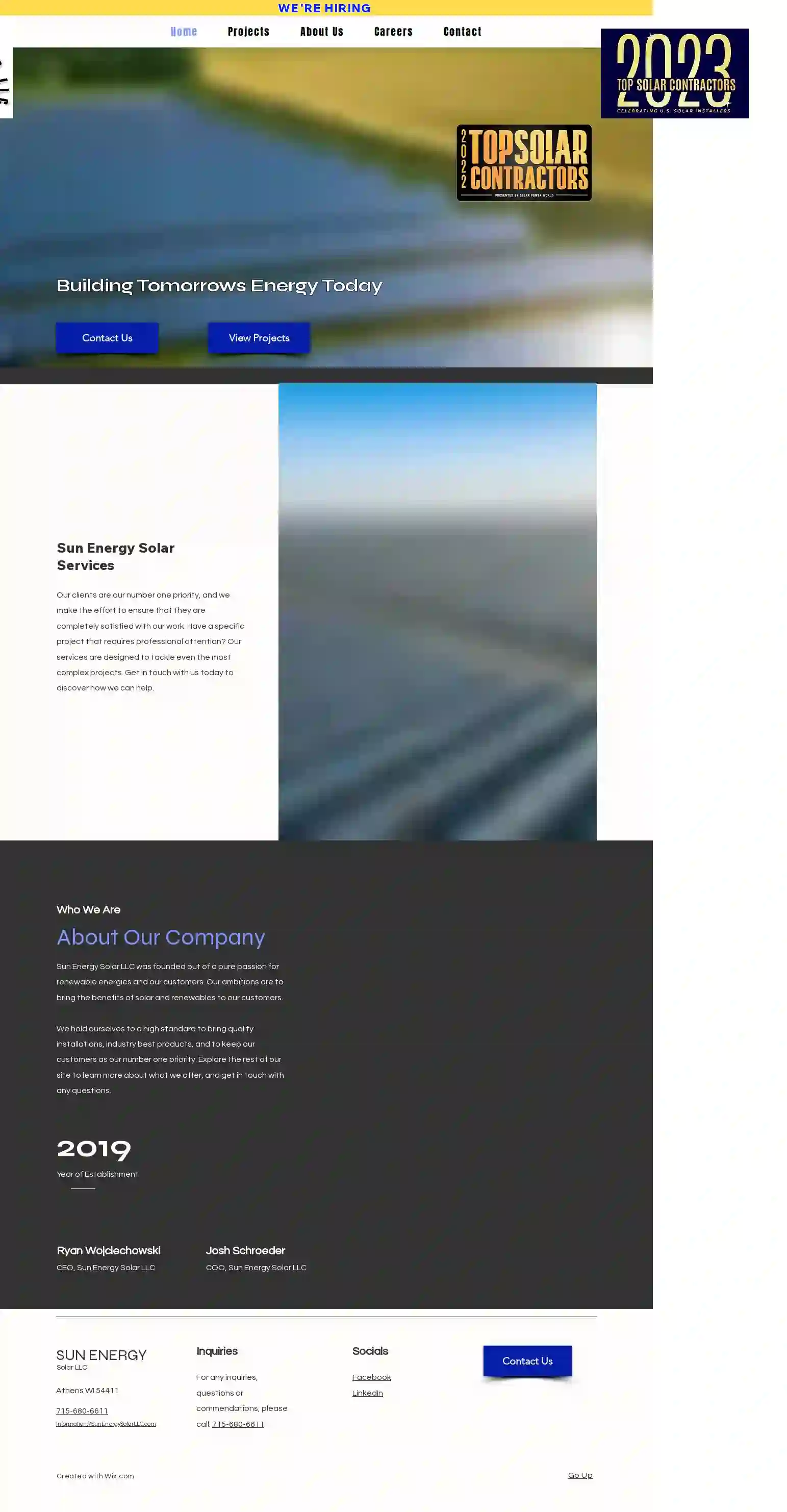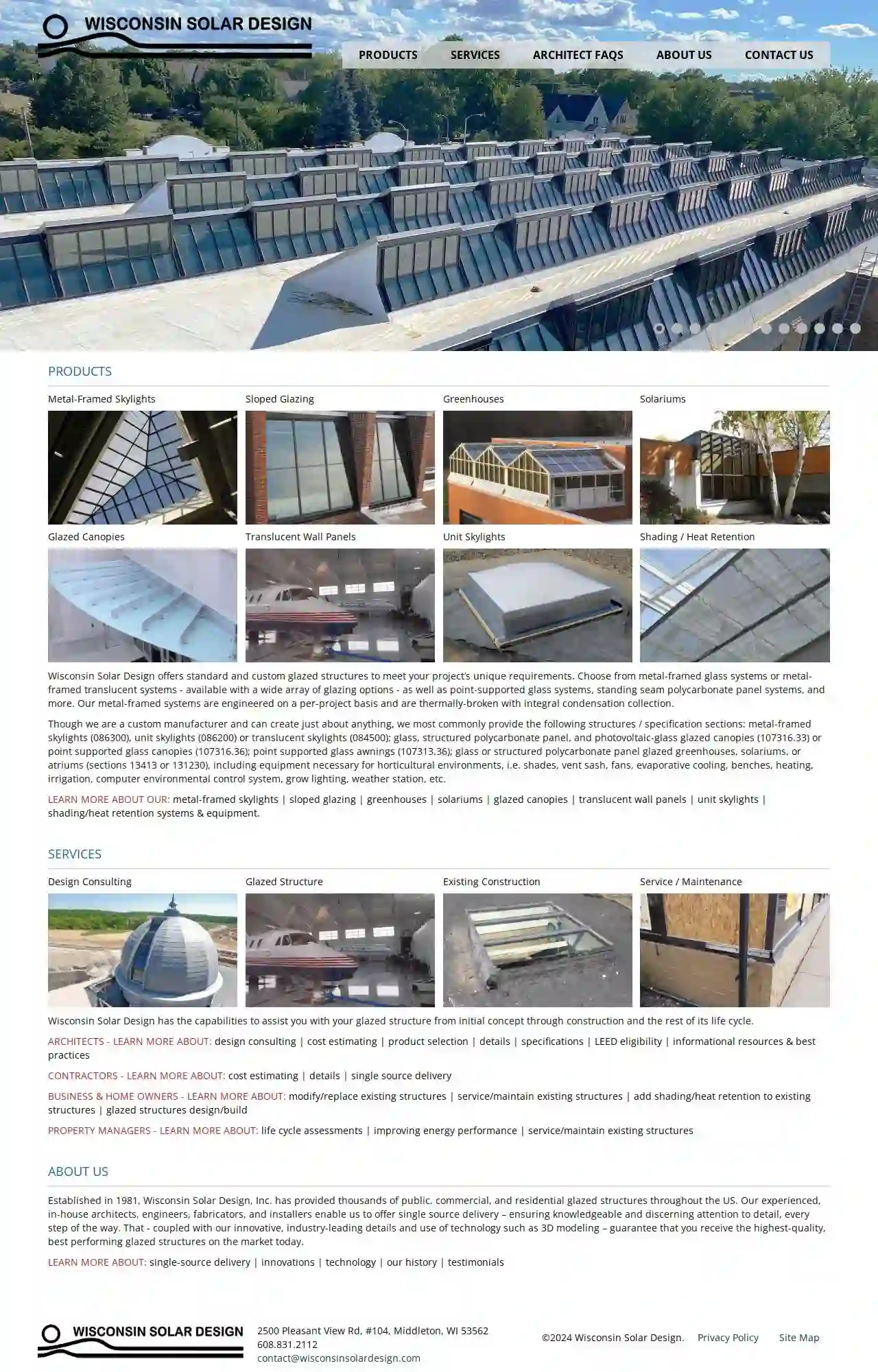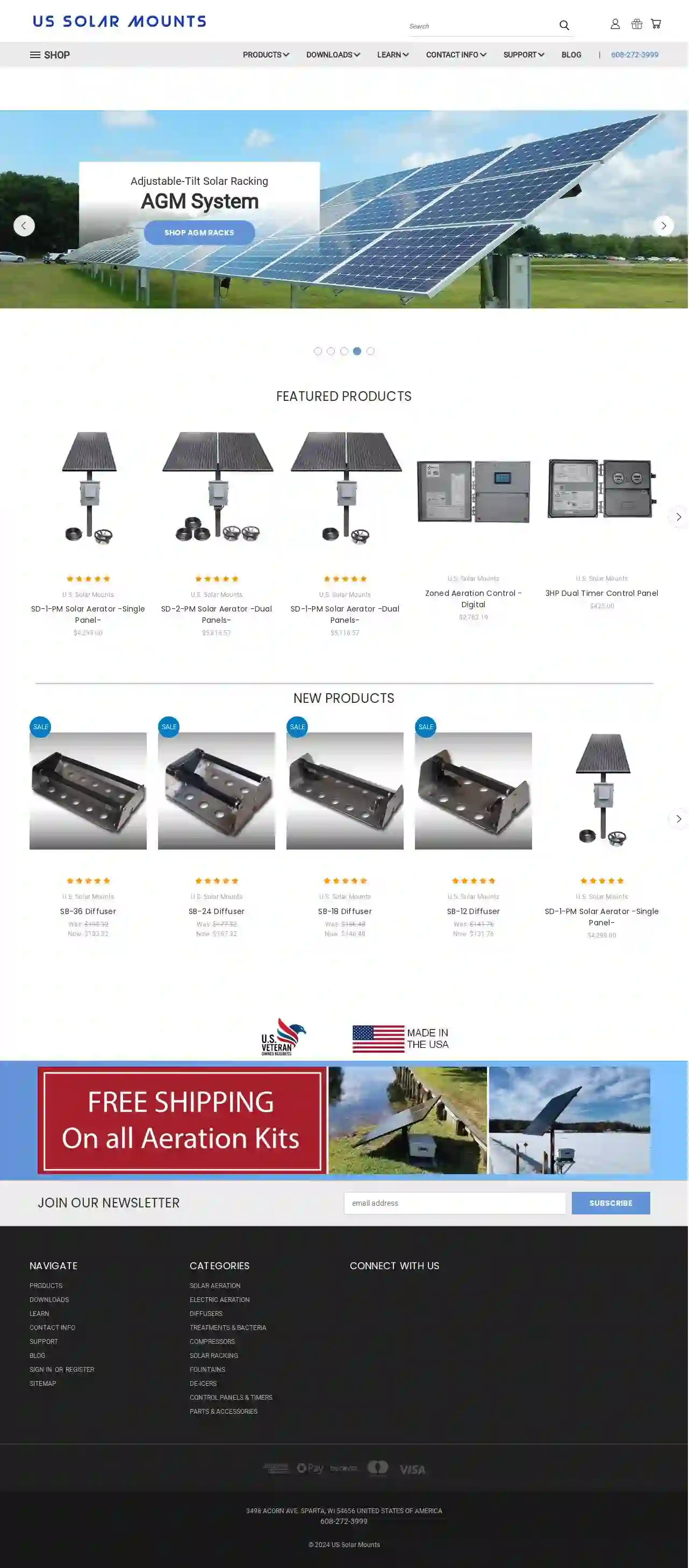Solar Installers Richland Center
Best Solar Panel Installers in Richland Center
Receive multiple Solar Company quotes for your project today! Compare profiles, reviews, accreditations, portfolio, etc... and choose the best deal.

Everlight Solar
4.5852 reviewsVerona, WI, 1155 Ambition St, Suite 100, 53593, USEverlight Solar is a leading provider of solar energy solutions, dedicated to helping homeowners and businesses harness the power of the sun to save money and reduce their carbon footprint. With a team of experienced professionals and a commitment to quality, Everlight Solar offers a range of services including solar panel installation, maintenance, and repair. They are certified by NABCEP and have received numerous awards for their work, including being named one of the fastest growing companies in the US by Inc. 5000.
- Services
- Why Us?
- Accreditations
- Our Team
- Testimonials
- Gallery
Get Quote
Sun Energy Solar llc
Athens, WI, Athens WI, 54411, USSun Energy Solar LLC was founded out of a pure passion for renewable energies and our customers. Our ambitions are to bring the benefits of solar and renewables to our customers. We hold ourselves to a high standard to bring quality installations, industry best products, and to keep our customers as our number one priority.
- Services
- Why Us?
- Our Team
- Gallery
Get Quote
Wisconsin Solar Design Inc.
2500 Pleasant View Road, Middleton, WI 53562, Madison, 53562, USEstablished in 1981, Wisconsin Solar Design, Inc. has provided thousands of public, commercial, and residential clients with custom glazed structures. Their team of architects and engineers utilize the latest in CAD and 3D modeling to prepare drawings and virtually mock-up details. This enables them to quickly and precisely fabricate projects in their modern shop facility. Wisconsin Solar Design offers standard and custom glazed structures to meet unique project requirements, including metal-framed glass systems, metal-framed translucent systems, point-supported glass systems, standing seam polycarbonate panel systems, and more.
- Services
- Why Us?
- Accreditations
- Our Team
- Testimonials
- Gallery
Get Quote
Full Spectrum Solar
597 reviews1240 East Washington Ave, Madison, 53703, USFull Spectrum Solar is a family owned and operated business that has been proudly serving Wisconsin for 20-years. Founded by brothers and UW-Madison Mechanical Engineering alumni, Burke and Mark have always strived to create a company culture that believes that the ethics of good business practice and contributing to the wellness of nature come first. We pride ourselves for how little we focus on marketing and instead believing that through great work and trust, our customers become our greatest supporters as a local small business.
- Services
- Why Us?
- Accreditations
- Our Team
- Testimonials
- Gallery
Get Quote
U.S. Solar Mounts Corp
3.73 reviews3498 Acorn Ave., Sparta, WI, 54656, USU.S. Solar Mounts is a leading provider of solar aeration systems, electric aeration, diffusers, treatments, compressors, solar racking, fountains, de-icers, control panels, and timers. They offer a wide range of products designed for various applications, including pond aeration, water treatment, and solar power solutions. Their products are designed to be reliable, efficient, and easy to install, making them suitable for both residential and commercial use. The company also provides resources such as manuals, spec sheets, and FAQs to help customers understand and maintain their products.
- Services
- Why Us?
- Accreditations
- Our Team
- Testimonials
- Gallery
Get Quote
Midwest Solar Power
4.971 reviewsMadison, WI, USA, 816 Walsh Rd, 53714, USMidwest Solar Power LLC was founded in 2009, bringing together backgrounds in construction, project management, and customer service to modernize the solar installation business. The company strives to be the premier local solar installer in Dane County by doing honest, high-quality work at a fair price. Each installation is unique, and Midwest Solar Power can design the right system to meet your energy needs.
- Services
- Why Us?
- Accreditations
- Our Team
- Testimonials
- Gallery
Get Quote
SunVest Solar LLC
4.18 reviewsN27 W24025 Paul Ct, Suite 100, Pewaukee, 53072, USSunVest Solar, LLC is one of the largest vertically integrated developers of distributed solar projects in the United States. Our mission is to advance clean energy nationwide with turnkey, cost-effective solar solutions. We offer business, nonprofit, and utility partners expertise across the value chain, including development, construction, financing, and operations. We develop community solar projects in key markets nationwide, distributed solar for commercial/industrial customers, and solar assets for utilities, co-ops, and municipalities.
- Services
- Why Us?
- Accreditations
- Our Team
- Testimonials
- Gallery
Get Quote
Epic Electric and Solar Inc.
48 reviewsEpic Electric and Solar Inc., 1310 Droster Rd, 1310 Droster Road, Madison, 53716, USEpic Electric and Solar is a residential electrical service provider specializing in electrical services and solar installations. They are dedicated to providing customer service that is second to none. Their mission is to save customers time and money by combining deep experience, high-quality parts, and dedication to delivering exceptional service.
- Services
- Why Us?
- Accreditations
- Our Team
- Testimonials
- Gallery
Get Quote
Au Solar Services LLC
512 reviewsWest Allis, WI, 53214, USAu Solar Services is a certified Enphase Technician providing a range of services including Enphase system servicing, underproduction assessment, critter guard installation, panel removal and reinstall, off-grid solar and storage install, and solar snow guard. With 3 years of experience in the solar industry, a Residential Journeyman Electrician license, Better Business Bureau Accreditation, NABCEP Photovoltaic Associates Degree, Enphase Energy System Certifications, and MREA membership, clients can trust in the highest quality care for their solar systems.
- Services
- Why Us?
- Accreditations
- Our Team
- Gallery
Get Quote
Solarus
3.6132 reviews440 East Grand Avenue, Wisconsin Rapids, WI 54494, 54494, USSolarus is a locally owned and invested company that provides fast, reliable, and affordable fiber internet services. They offer various speed options including Economy, Family, Deluxe, Premium, and Ultra, catering to different needs and budgets. The company is committed to the success of the communities they serve and has a strong presence in Wisconsin Rapids and Manawa. They provide 24/7 local tech support and have a team of knowledgeable and professional staff. Solarus also supports local initiatives and community events, demonstrating their commitment to giving back.
- Services
- Why Us?
- Accreditations
- Our Team
- Testimonials
- Gallery
Get Quote
Over 4,210+ Solar Contractors on our directory
Our solar pros operate in Richland Center and surroundings!
SolarCompaniesHub has curated and vetted the Best Solar Companies in Richland Center. Find a trustworthy pro today.
Frequently Asked Questions About Solar Installers
- System size (measured in kilowatts, or kW)
- Type of solar panels (monocrystalline, polycrystalline, thin-film)
- Roof complexity (pitch, size, obstructions)
- Labor costs in your area
- Available incentives and rebates
- Monocrystalline: Made from a single silicon crystal, known for high efficiency (typically 18-22%) and sleek black appearance.
- Polycrystalline: Made from multiple silicon crystals, slightly less efficient (15-17%) but often more affordable than monocrystalline.
- Thin-film: Made from thin layers of photovoltaic material, lower efficiency (8-12%) but can be flexible and lightweight.
- Cash Purchase: The most straightforward option, providing the greatest long-term savings but requiring a larger upfront investment.
- Solar Loans: Loans specifically designed for solar installations, often with favorable terms and interest rates.
- Solar Leases: A third-party company owns the system and leases it to you, allowing you to go solar with little or no upfront cost, but you won't own the system or receive tax benefits.
- Power Purchase Agreements (PPAs): Similar to leases, but you pay for the electricity generated by the system, not the system itself.
- Home Equity Loans or Lines of Credit: Borrow against the equity in your home.
What is the average cost of solar panel installation in USA?
What are the different types of solar panels?
How can I finance my solar panel installation?
Can I go completely off-grid with solar panels?
What is the average cost of solar panel installation in USA?
- System size (measured in kilowatts, or kW)
- Type of solar panels (monocrystalline, polycrystalline, thin-film)
- Roof complexity (pitch, size, obstructions)
- Labor costs in your area
- Available incentives and rebates
What are the different types of solar panels?
- Monocrystalline: Made from a single silicon crystal, known for high efficiency (typically 18-22%) and sleek black appearance.
- Polycrystalline: Made from multiple silicon crystals, slightly less efficient (15-17%) but often more affordable than monocrystalline.
- Thin-film: Made from thin layers of photovoltaic material, lower efficiency (8-12%) but can be flexible and lightweight.
How can I finance my solar panel installation?
- Cash Purchase: The most straightforward option, providing the greatest long-term savings but requiring a larger upfront investment.
- Solar Loans: Loans specifically designed for solar installations, often with favorable terms and interest rates.
- Solar Leases: A third-party company owns the system and leases it to you, allowing you to go solar with little or no upfront cost, but you won't own the system or receive tax benefits.
- Power Purchase Agreements (PPAs): Similar to leases, but you pay for the electricity generated by the system, not the system itself.
- Home Equity Loans or Lines of Credit: Borrow against the equity in your home.